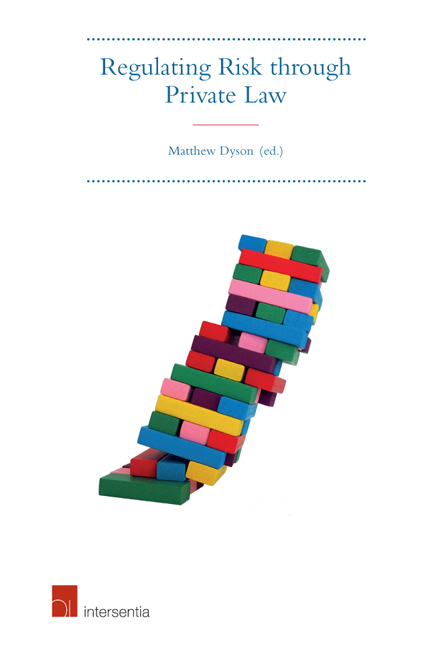Book contents
- Frontmatter
- Preface
- Contents
- Table of Cases
- List of Contributors
- Chapter 1 Introduction
- Part I Risk Overviews
- Part II State of the national art on risk
- Chapter 11 Legal Risk in International Commercial Disputes
- Chapter 12 Medical Accidents and Pharmaceutical Product Liability in France
- Chapter 13 Bearing and Sharing Risk in the Swedish Welfare State
- Chapter 14 Modernisation and Risk Regulation in the Italian Food Sector
- Chapter 15 Motor Vehicle Accidents Caused by Game Wandering onto Spanish Roads
- Chapter 16 Dutch Tort Law at the Crossroads: Judicial Regulation of Health and Environmental Risks
- Chapter 17 Sub Terra: Risk in the Chilean Mining Industry
- Chapter 18 Constitutionalising Rights and Reacting to Risk in South Africa
- Chapter 19 Regulating Risk in Brazil: Resort to General Clauses
- Chapter 20 What does Risk-Reasoning do in Tort Law?
- Chapter 21 Epilogue: What does Risk-Reasoning Tell Us about Tort Law?
- Index
- About the Editor
Chapter 15 - Motor Vehicle Accidents Caused by Game Wandering onto Spanish Roads
from Part II - State of the national art on risk
Published online by Cambridge University Press: 13 October 2018
- Frontmatter
- Preface
- Contents
- Table of Cases
- List of Contributors
- Chapter 1 Introduction
- Part I Risk Overviews
- Part II State of the national art on risk
- Chapter 11 Legal Risk in International Commercial Disputes
- Chapter 12 Medical Accidents and Pharmaceutical Product Liability in France
- Chapter 13 Bearing and Sharing Risk in the Swedish Welfare State
- Chapter 14 Modernisation and Risk Regulation in the Italian Food Sector
- Chapter 15 Motor Vehicle Accidents Caused by Game Wandering onto Spanish Roads
- Chapter 16 Dutch Tort Law at the Crossroads: Judicial Regulation of Health and Environmental Risks
- Chapter 17 Sub Terra: Risk in the Chilean Mining Industry
- Chapter 18 Constitutionalising Rights and Reacting to Risk in South Africa
- Chapter 19 Regulating Risk in Brazil: Resort to General Clauses
- Chapter 20 What does Risk-Reasoning do in Tort Law?
- Chapter 21 Epilogue: What does Risk-Reasoning Tell Us about Tort Law?
- Index
- About the Editor
Summary
Spain is a country of many complex relationships: the centre's relationship with the ‘foral regions’ like Catalonia and the Basque country; religion and learning; humankind and animals. Spain's size and widely distributed historic cities mean there is room for diversity. It also means that two common activities can easily collide: the use of roads and the presence of animals. In particular, how Spanish tort law manages collisions or similar accidents between game and motor vehicles can unlock significant insights into how Spanish law conceives of, creates liability from and seeks to control risk. This area of law has recently undergone a significant change in legal regulation at the point where two strict liability regimes, one for hunters and one for drivers, overlap. That change has highlighted the politicisation of risk and liability in Spain and the role of legislative change in responding to perceived liability risk perhaps more than the risk of harm to others.
GAME IN SPAIN
Spain haof game onto public roads, driven by hunting or by shift s in the population s long been a country where hunting is a very important activity, not only in connection with culture and leisure, 1 but also for economic reasons. At the same time, hunting is something which divides society between those who hunt or earn a living from it, and those who oppose it for environmental or other reasons. The risks of the activity of hunting are significant. Hunting commonly involves guns, thus it is a source of risk in the sense described in the first Spanish chapter (Ch. 6); but hunting also involves the behaviour of wild animals themselves, and thus is a source of non-man-made possibilities of harm, i.e. danger in the sense pointed out already. A specific problem is the escape density.
Accidents caused by escaping game have become a significant and technically complex area. According to a study carried out on behalf of an insurance company, the animals involved in motor vehicle accidents are mostly wild boars (33% of cases), dogs (30%) –obviously not game –or roe deer (17.5%).
- Type
- Chapter
- Information
- Regulating Risk through Private Law , pp. 361 - 374Publisher: IntersentiaPrint publication year: 2018

